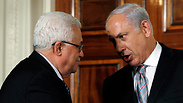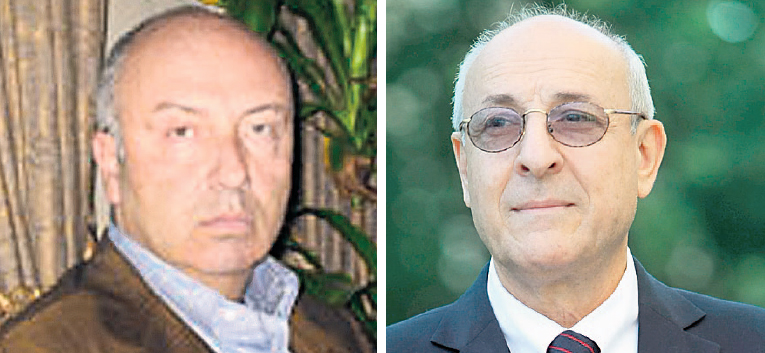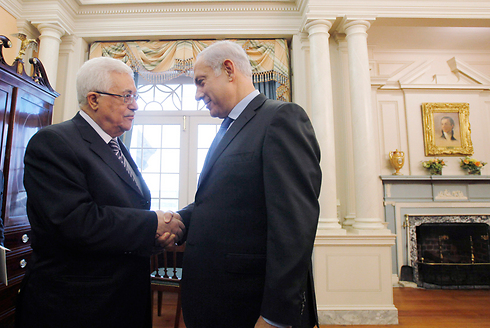
Netanyahu's mistake was trusting Abbas
Analysis: An Israeli and a Palestinian, each sent by their respective leaders, held years of secret talks summarized in an August 2013 document showing far-reaching Israeli concessions; but while Netanyahu dispatched his most trusted aide, Abbas was playing a different game.
Netanyahu had dispatched his senior aide, lawyer Yitzhak Molcho, to meet with Abbas' affiliate Hussein Agha.
Agha, an Oxford professor born in Lebanon, joined the Palestinian Liberation Organization as a youth and is considered one of Abbas' closes affiliates, while Molcho went on to serve as Israel's leading peace negotiator - alongside Tzipi Livni - during the last round of US-brokered peace talks.
The document shows that Netanyahu had offered what appeared to be drastic concessions to the Palestinian leadership on a number of core issues, including land swaps, a potential deal regarding Jerusalem and even a limited right of return for Palestinians.
Among these concessions, the document includes what seems to be an opening for an Israeli return to the 1967 Green Line borders – a longstanding Palestinian demand that Netanyahu has rejected on numerous occasions as a precondition for a peace deal – on the basis of a "mile-for-mile" exchange ratio.
Related stories:
- Netanyahu's secret peace offer concessions to Palestinians revealed
- Bennett: 'Next disengagement is already here'
It reveals that not only was Netanyahu willing to trade land with the Palestinians, but was also amenable to offering them full restitution for lands seized by Israel during the 1967 Six Day War.
As part of a proposed land swap, the document lays out the framework for uprooting a large number of West Bank settlements and even stipulated leaving some settlers in the West Bank under Palestinian Authority control.
Regarding Jerusalem, which the Palestinians want as their capital and has been a non-negotiable point for Israel, the document's wording is more careful, but not devoid of significance, offering an implicit recognition of the Palestinian claim over East Jerusalem.
The document also shows the Palestinians were offered a permanent foothold in the Jordan Valley, an area which Israel was reluctant to concede control over during the previous round of peace talks. That last round of negotiations almost fell apart after a lawmaker from Netanyahu's Likud party spearheaded a bill that would annex the territory to Israel, effectively taking it off the table.
Furthermore, there was surprising Israeli leeway regarding the much-debated Palestinian right of return for those displaced on the eve of Israel's formation in 1948. According to the document, Israel offered Palestinian "refugees" the right of return on a personal – as opposed to national – basis.
The article relating to Jerusalem was vaguely worded and appended with a warning: "Any solution must address the historical, social, cultural and effectual ties of both peoples to the city and offer protection to the holy sites."
But were the talks – and the understandings they produced - really all they seemed?
From one aspect, the choice to use Molcho and Agha was a stroke of brilliance. Both are articulate, broad-minded and pragmatic men – men who are capable of reaching an agreement.
Yet from a different and far more significant perspective, the choice was a miserable one. Molcho says what Netanyahu says; they can't be separated. All the players in the arena know that Netanyahu keeps a close eye on his people. In contrast, Agha is his own man. Netanyahu believed that Agha was Abbas' Molcho. He was wrong. When it came to the crunch, Abbas claimed he had no hand in the agreements Agha reached; nothing was reported to him and nothing won his stamp of approval.
Abbas, in fact, used Agha as bait. He drew Netanyahu into making concessions without committing to concessions of his own. Abbas is a master when it comes to this game of poker.
From the perspective of the Israeli center-left – parties such as the Zionist Union and Yesh Atid, and Meretz too perhaps – the agreement is a very reasonable one. The Likud and Bayit Yehudi voters aren't likely to see it as such.
One should recall that the talks took place during Netanyahu's previous term in office, before the Kerry initiative, under a coalition government in which Netanyahu was the sole authority with regards to the Palestinian issue.
The concessions he agreed to on substantial issues such as borders, refugees and settlements appear to indicate a fierce and far-reaching desire to reach an agreement that would end the conflict. At the same time, Netanyahu implemented measures on the ground that appeared to indicate otherwise. Apparently, he wanted to be seen as a man eager for peace, but on one condition – that he never actually achieved that peace.
For the most part – a zigzag. His pendulum swings back and forth in a frenzy – from far-reaching concessions, in terms of his voters, to no concessions at all; from right to left, and then right again. There's no purpose to it, but there's movement at least.
There is a vast and irreconcilable divide between Netanyahu's hawkish speeches and the instructions he conveyed to his representative in the talks. Was Netanyahu seeking to pull one over on the Palestinians? Was he, in contrast, looking to pull one over on his voters? Was he trying to dance at two weddings with one rear end? All of the above appear correct. The pirouette was delightful; the choreography stunning. And when the curtain came down on the drama, it turned out that Netanyahu was only fooling himself.












